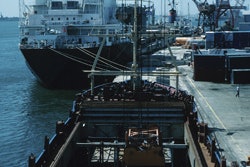By Will O'Shea
When it comes to measuring carrier performance, the terms "last mile" and "last to know" can be a little too close for comfort.
Many last-mile deliveries take place in private residences, making it difficult for companies to get an accurate read on exactly how well their delivery partners have performed. And even though some consumers are more than willing to be candid about negative experiences, their candor is often shared with friends – or over the Internet – instead of with the company.
But, thankfully, several of today's technological advances can help companies travel where their executives and customer satisfaction team can't, providing ample opportunity to manage, monitor and mend fences like never before.
Take handheld scanning devices, for example. In addition to doing a great job of verifying delivery, they offer companies invaluable, real-time access to carriers' on-time performance data by team, city or region.
Or consider global positioning systems. Their ability to help stakeholders pinpoint driver teams' locations at any given time can be especially useful for understanding how well carriers and individual carrier teams are sticking to the routes that have been so carefully optimized for them – and flagging any deviations that might suggest the need for closer scrutiny.
And don't underestimate the supervisory value of automated phone surveys. Not only do these surveys make it possible to contact customers almost as soon as a delivery is complete (while the delivery experience is fresh in their minds), they also enable companies to analyze and act upon the data collected from these surveys almost immediately, which is especially invaluable if a customer is disgruntled. By contrast, the feedback from a mailed survey can take weeks to receive and tabulate.
Whether you use one of these tools or all of them – and whether you choose options with all the bells and whistles or just the basics – your company is bound to benefit from better performance, because even the most conscientious and motivated of delivery professionals is only human. And most humans tend to try harder when they know someone's watching.
Just as important, you're likely to wind up with much more satisfied customers, provided you treat the information you've gathered as part of the journey rather than the final destination.
For example, if the time uploaded from a delivery team's electronic signature capture shows that a team is running behind schedule, why not make it a policy to have a customer service rep call the other customers who are expecting deliveries that day to let them know the team will be late? Considering that many people have to take time off work or rearrange their schedules in order to be at home for a delivery, it's a small courtesy they'd surely appreciate.
Or, if a customer gives a delivery team a below-average rating during a phone survey, why not make it standard operating procedure that someone follow up with the customer to find out more and extend an apology (or better yet, propose a solution)? Granted, it may mean that your CSR occasionally gets an earful. But it's probably an earful your company needs to hear – and that it would prefer to hear instead of finding out about it via a negative post on Facebook or Twitter.
And yes, it may cost your company a little more money, as will robust versions of the technologies I've suggested. But it's a small price to pay considering how aggressively all companies must compete for customers these days and how important it is to maintain high levels of service and customer satisfaction every step of the way.
As long as there are individual home deliveries, "last mile" and "last to know" will always have the potential to be closely linked. But as long as there are good technologies, that doesn't mean they necessarily have to be.



















